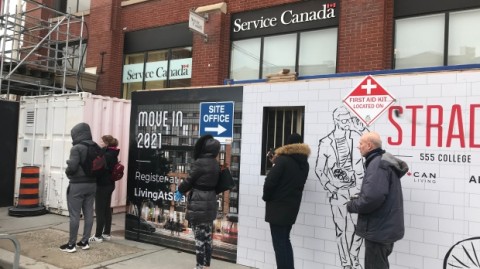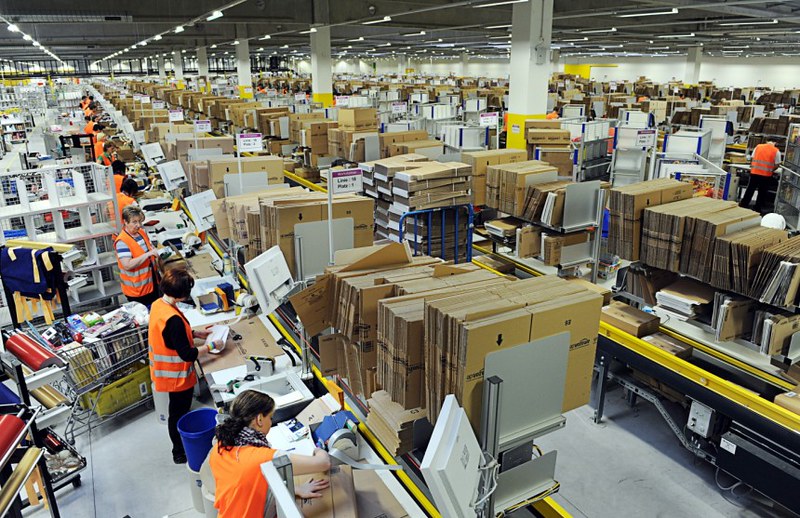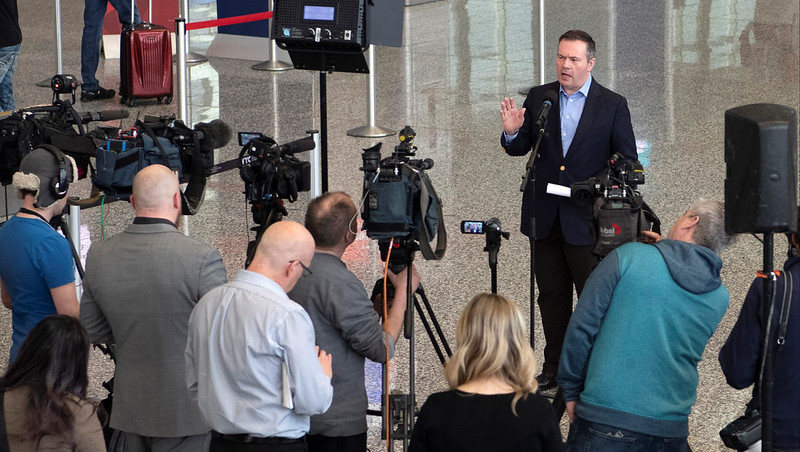9 avril 2020

Photo by Craig Wadman/CTV News Toronto. Unemployed workers line up outside a Service Canada in Toronto to file EI. At least a million workers have lost their jobs according to early numbers from StatsCan released April 9, 2020.
The Fair Tax News, 9 April 2020
By Erika Beauchesne
Greater protections needed as Canada responds to COVID-19
Early numbers from Statistics Canada today show a million workers have lost their jobs and twice that amount have lost hours. As many had speculated, the hardest hit have been youth, women and temporary workers. These are very preliminary figures and experts predict the larger picture is likely to be much worse.
The federal government has moved with impressive speed and flexibility to “do whatever it takes” to deal with the health and economic impacts of the COVID-19 pandemic—but there’s still much work to do to protect vulnerable workers and businesses, and to safeguard public finances against abuse.
With more than $100 billion committed so far, this is already the largest spending program in Canadian history -- necessary to help the millions of newly unemployed and save hundreds of thousands of businesses.
But the measures so far still leave many workers and individuals unprotected while opening holes that could be exploited by those who don’t need the help.
Recent research by the Canadian Centre for Policy Alternatives found that a third of newly unemployed Canadians will receive nothing from either Employment Insurance or the Canada Emergency Relief Benefit. The recently announced expansion of Canada’s summer job program will help only a small number of two million plus students and seasonal workers’ jobs seeking jobs this summer. The federal government this week also lowered the threshold for businesses that will be eligible for its wage subsidy. There’s no reason why it shouldn’t also expand the CERB for workers who aren’t covered by the benefit.
This crisis demonstrates how large the gaps are in our income security programs, and why we need permanent reforms to improve them. If we can mobilize at this speed and scale in a pandemic, there’s no reason why we can’t fix these and other challenges after the crisis.
Canadians for Tax Fairness has also raised flags about how the $73-billion program could be taken advantage of by businesses that don’t need the funding. While the government needs to act quickly, it also needs to get it right or risk wasting revenues and fostering mistrust about social spending. To address these concerns, C4TF proposed several reforms that could be applied on the back end of programs, including transparency and accountability measures and including provisions to recover and tax back amounts from companies that ultimately didn’t need it.
In a series of interviews last week with regional CBC radio stations and the Globe and Mail, C4TF director Toby Sanger talked about what’s needed and what more can be done to help Canadians.
Leadnow is also running a petition asking the federal government to close the gaps in the COVID-19 emergency benefits, which you can sign on their website.

Workers at an Amazon warehouse package goods. While most businesses will suffer due to COVID-19 closures, some large digital giants that are notorious for dodging taxes will profit. It’s time for Canada to tax them. Scott Lewis, flickr.
Pandemic an opportunity to plug holes in financial, social security systems:
As C4TF communications coordinator Erika Beauchesne recently argued in a Toronto Star opinion piece, Canada should pay for the costs of the COVID-19 crisis by making the tax system fairer and ensuring everyone pays their fair share.
We have also called for other longer-term solutions to help government pay for these costs, such as taxing foreign e-commerce giants that are profiting as more individuals and businesses move online, introducing an excess profits tax and wealth taxes.
Amazon was recently selected by the Canadian government to help distribute protective equipment to communities, despite its notorious reputation for tax-avoidance and employee health and safety practices. As a recent New York Times editorial explored, the company has become an unfortunate necessity in the new COVID-19 reality.
Coming out of this crisis, all countries should require online giants pay their fair share. An article in L'Actualité and this excellent op-ed in L’Obs (co-written by tax justice activists from TaxCOOP) looks at the biggest digital companies and how small their billionaire owners' contributions have been compared to their wealth.
This pandemic has highlighted the problems of relying on foreign suppliers and why we should improve our public and domestic capacity -- not use tax preferences and procurement to further benefit e-commerce giants like Amazon.
COVID-19 has underlined other key areas of government where we need to strengthen our health care systems, improve conditions at long-term care and retirement residences, provide better pay and working conditions for these essential workers, and reform weak social safety nets.
C4TF has also long advocated for increased resources to help Canada Revenue Agency deliver benefits to vulnerable Canadians and investigate tax evasion. On Monday, the government began taking applications for its multi-billion-dollar emergency support programs. As millions of laid off workers flooded the CRA website and phone lines for support this week, the need for an adequately staffed and funded tax agency has never been clearer.
There are many more marginalized people who won’t receive the benefits they are entitled to because they lack the resources, knowledge and support to apply, especially with community tax clinics and other services closed. C4TF has long called for Canada to adopt a system of automatic tax and benefit filing. This would reduce the cost involved with annual tax filing and ensure that people get the benefits they need, especially in a crisis.
Just as millions of lives have been turned upside down in this pandemic, ineffective policies should be uprooted as well.
In recent weeks, many thoughtful op-eds have explored opportunities for progressive change post-crisis, but maybe the most remarkable call came from the editorial board of the UK’s normally conservative Financial Times, which acknowledged that policies previously dismissed as radical, such as wealth taxes and basic income, will be essential to the world’s recovery.

A still from the Radio-Canada show Enquête, which went undercover to reveal how easy it is to purchase Montreal real estate with dirty money.
Quebec moves toward beneficial ownership transparency
Quebec has taken an important step against money laundering and tax evasion by requiring companies to make public information about their ultimate beneficial owners. The province outlined its new standards for private corporations in its 2020-21 budget last month.
The changes in Quebec couldn’t be timelier. After B.C. brought in new rules to crack down on money laundering, recent reports suggest illicit activity is travelling east to major cities such as Toronto and Montreal.
Just days after the Quebec budget, an undercover investigation by the Radio-Canada television show Enquête revealed how easy it is to purchase Montreal real estate with dirty money. Canada’s weak transparency rules allow criminals to hide behind shell companies and mask their illicit funds in the economy through sectors such as real estate.
In response to the investigation, Canadians for Tax Fairness and coalition members Transparency International Canada and Publish What You Pay Canada reiterated our call for a pan-Canadian public registry of beneficial owners to help authorities crack down on financial crime. While it is encouraging to see provinces like B.C. and Quebec taking a leadership role, a national coordinated approach is needed to effectively tackle snow washing across Canada.

Photo: Marco Verch, flickr
Government action inadequate four years after Panama Papers:
Canada marked yet another anniversary of the Panama Papers leaks with little progress in the way of policies or punishments to tackle offshore tax dodging. While other countries have recouped millions, there hasn’t been a single conviction in Canada.
To highlight this inaction, Canadians for Tax Fairness and Échec aux Paradis Fiscaux together called on the government for concrete measures to finally get tough on tax havens, including reforming domestic and international laws to require corporations to pay their fair share and introducing harsher penalties for tax evaders and their enablers.
The Panama Papers and subsequent Paradise Papers were first reported on by the International Consortium of Investigative Journalists, which earlier this year exposed another scandal, the Luanda Leaks. While smaller in scale than the Panama and Paradise Papers, this latest investigation was significant because it traced how accounting, law and consulting firms facilitated global tax evasion.
The research and advocacy group Global Financial Integrity recently published a piece exploring the role that the world’s biggest four accounting firms play in aiding and abetting corruption.
Until governments across the world toughen rules, corporations and the very rich will continue to take advantage of gaps in the system. Bloomberg recently reported how executives continue to benefit from tax havens even while seeking aid for their corporations in this crisis.
Countries will need to take action to stop the bleeding of revenues if they are going to adequately fund the fight against Covid-19.

Alberta Premier Jason Kenney takes questions from the media last month. The province recently eliminated more than 20,000 public jobs.
Alberta UCP lays off 20K+ public sector workers amid Covid crisis
Alberta’s Conservative Premier Jason Kenney didn’t let a global pandemic get in the way of slashing at least 20,000 public sector jobs – among largest layoffs in provincial history.
At least 1,4000 job losses were already projected from the UCP’s recent austerity budget, which included an annual $1.7 billion tax cut for large corporations and highly unrealistic projections of oil prices rebounding—and that was even before most of the world’s economy became grounded.
Kenney justified the latest round of cuts by arguing the savings will help pay for Alberta’s response to the pandemic, but cutting jobs and public supports during an economic crisis doesn’t help anyone. Progressive governments like B.C. have demonstrated how investing in public services and requiring everyone to pay their fair share can lead to a stronger economy, allowing the province to implement more measures to combat the pandemic than other provinces, including taking over and boosting pay at long-term health care centres.
As we pointed out in our report earlier this year, corporate tax cuts do not fulfill their job-creation promises, but are instead used as an excuse to make harmful cuts to vital services and programs.
The mass layoffs were quickly attacked in both alternative and traditional media. An op-ed in Postmedia called out the hypocrisy of a government cutting staff while telling businesses to retain their workers through the pandemic. Another writer pointed out the UCP’s ‘so-called blueprint for jobs’ has resulted in the exact opposite – historic layoffs. University of Calgary economists also criticized the UCP’s framing of the pandemic to justify extensive job cuts, remarking how just days earlier, the government committed more than $1 billion in funding for the Keystone XL pipeline. Another op-ed warned Kenney’s double-down approach couldn’t come at a worse time as analysts predict an ‘energy market Armageddon’.